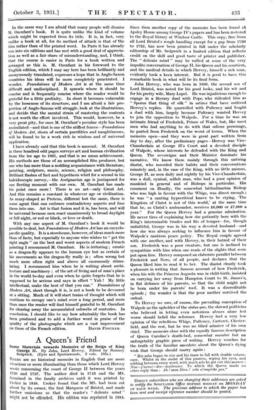A Queen's Friend
Some Materials towards Memoirs of the Reign of King George II. By John, Lord Hervey. Edited by Romney Sedgwick. (Eyre and Spottiswoode. 3 vols. 105s.) TnEnE are no historical memoirs in English that arc more vivacious or more illuminating than those which Lord Hervey wrote concerning the court of George II between the years 1730 and 1737. The author died in 1743 and the MS. remained in the family archives until it was printed by Croker in 1848. Croker found that the MS. had been cut about by its owner, the first Marquess of Bristol, and made further omissions so that the reader's "delicate mind " might not be offended. His edition was reprinted in 1884.
Since then another copy of the memoirs has been found at Apsley House among George IV's papers and has been restored to the Royal library at Windsor Castle. This copy, free from all Lord Bristol's rough handling except for a gap from 1730 to 1732, has now been printed in full under the scholarly editorship of Mr. Sedgwick in a limited edition that reflects credit on the skill and good taste of printer and publisher. The " delicate mind " may be ruffled at some of the very
impolite conversation of George II, his Queen and his courtiers, and the medical details in which Hervey, himself a sick man,
evidently took a keen interest. But it is good to have this remarkable book in what will be its final form.
John Hervey, who was born in 1696, the second son of Lord Bristol, was noted for his good looks, and his wit and for his pretty wife, Mary Lepel. He was injudicious enough to engage in a literary duel with Pope, who ridiculed him as " Sporus that thing of silk " in satires that have outlived Hervey's replies. He quarrelled with Pulteney and fought a duel with him, largely because Pulteney wanted Hervey to join the opposition to Walpole. For a time he was an intimate friend of Frederick, Prince of Wales, but, like most men who had anything to do with that odious personage, he parted from Frederick on the worst of terms. When the memoirs open—and they were in great part written from day to day, after the preliminary pages—Hervey was Vice- Chamberlain at George II's Court and a devoted disciple of Walpole, whose interests he defended with the King and Queen. The sovereigns and their Minister dominate his narrative. We know them mainly through this untiring diarist, who recorded their habits and their conversations minutely and, in the case of the King, with no little animus. George II, as seen daily and nightly by his Vice-Chamberlain, was a dull, cynical, selfish man, who had a poor opinion of mankind in general and of Bishops in particular. His comment on Homily, the somewhat latitudinarian Bishop who was high in favour with the Whigs, was direct enough ; he was " a canting hypocritical knave to be crying, 'The Kingdom of Christ is not of this world,' at the same time that he, as Christ's ambassador, receives £6,000 or £7,000 a year." For the Queen Hervey had a genuine admiration.
He never tires of explaining how she patiently bore with the King's interminable tirades and fits of temper—for, though unfaithful, George was in his way a devoted husband—and how she was always seeking to influence him in favour of Walpole's cautious peace policy. The Royal couple agreed with one another, and with Hervey, in their hatred of their son. Frederick was a poor creature, but one is inclined to sympathize with him when one reads of the slights that were put upon him. Hervey composed an elaborate parallel between Frederick and Nero, of all people, and declares that the Queen liked him to read it to her. The diarist clearly took a pleasure in writing that famous account of how Frederick, when his wife the Princess Augusta was in child-birth, insisted on carrying her away from Hampton Court to St. James's, in flat defiance of his parents, so that the child might not be born under his parents' roof. It was a discreditable episode ; the wonder is that the poor mother survived the ordeal.
To Hervey we owe, of course, the prevailing conception of Walpole as the upholder of the status quo, the shrewd politician who believed in letting even notorious abuses alone lest worse should befall the reformer. Hervey had a very low opinion of the rebellious Whigs, Pulteney, Carteret, Chester- field, and the rest, but he was no blind admirer of his own chief. The memoirs close with the equally famous description of Queen Caroline's death-bed, somewhat macabre but an unforgetably graphic piece of writing. Hervey vouches for the truth of the familiar anecdote about the Queen's dying wish that George should marry again :
" His sobs began to rise and his tears to fall with double vehem- ence. Whilst in the midst of this passion, wiping his eyes, and sobbing between every word, with much ado he got out this answer : Non—faurai—des--maitreeses. To which the Queen made no other reply than : Ah ! mon Dieu I cela n'ensp4che pas."










































 Previous page
Previous page